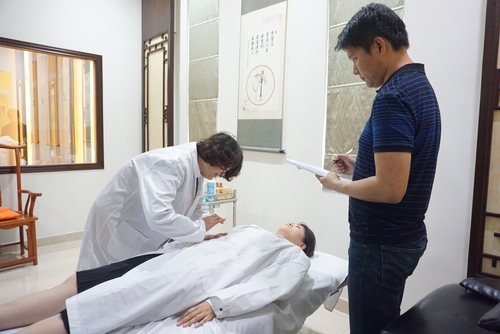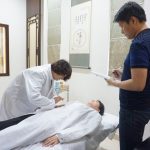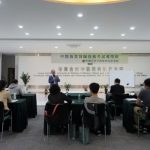 The professors clarified the exam preparation instructions to the participants through a simulation exam.
The professors clarified the exam preparation instructions to the participants through a simulation exam.
In order to facilitate the TCM physicians (practitioners) in Macao to learn about the Traditional Chinese Medicine Practitioners Qualification Exam of Mainland China, by broadening the scope of their fields of specialization and practice, and further improve their professional competences, the Guangdong-Macao Traditional Chinese Medicine Science and Technology Industrial Park (hereinafter referred to as the “Industrial Park”) held a "Guidance Course for Traditional Chinese Medicine Practitioners Qualification Examination " from 14 to 15 of April, at the Industrial Park. A team of professors and experts were invited to deliver presentations on the details of the program and preparation for the exam. The Course has attracted approximately 10 TCM registered physicians from Macao.
The Traditional Chinese Medicine Practitioners Qualification Exam is organized by the National Health Commission of China, the State Administration of Traditional Chinese Medicine of the Republic of China and Practitioner Qualification Examination Board of the National Health Commission of China. The objective of the Exam is to assess the level of knowledge and professional skills as required to become a TCM practitioner. As for the two-day course, the Industrial Park has invited a team of professors and experts to conduct an orientation and preparation for the Exam, through detailed presentation of useful information, among them ranging from registration to the exam outline. Taking into account the two integral parts of the Exam, including "practical skills" and "general medical written exam", the Industrial Park conducted three simulation sessions comprising "theory written test", "practical skills " and "clinical discussion", to facilitate the candidates in drawing up study plans for different phases of the exam preparation, thereby, strengthening their knowledge and professional skills.
In addition, the Chinese medicine physicians from Macao who have participated in the training will have the opportunity to participate in several international exchange programs in TCM organized by the Industrial Park, respectively in Mozambique, Portugal, Thailand and other countries and regions. Through participation in activities, such as overseas internship, clinical training, and overseas volunteer-based medical clinics, the physicians can put into good practice and improve their professional skills.
As the first project implemented under the “Framework Agreement of Cooperation between Guangdong and Macao”, the Industrial Park also serves as an important catalyst toward the promotion of adequate diversification of Macao's economy and development of the traditional Chinese medicine industry. The Industrial Park has been committed to establishing itself as an “International Window for the TCM Industry and Culture under the Belt and Road ". With a view to creating a favorable environment and advantages for the development of traditional Chinese medicine industry in Macao, the Industrial Park also hopes to create a good career development platform for the Macao youth. Through organizing a series of professional training activities in TCM, the Industry Park expects to provide TCM practitioners from Macao, a comprehensive platform for the development, learning, and practice, so as to improve their professional competence and cultivate TCM talents. At the same time, as a means of contribution to Macao, the Industry Park intends to promote the TCM culture and techniques both in the Portuguese-speaking countries and along the "Belt and Road" countries.
View gallery


